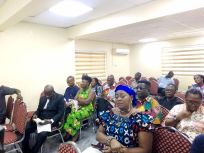|
Getting your Trinity Audio player ready...
|
The Ghana Journalists Association (GJA) on Wednesday called off its 2025 Annual General Meeting (AGM) over its inability to raise quorum to conduct business.
The meeting, initially scheduled for Monday, March 31, 2025, was postponed to Wednesday, April 2, due to the Eid-ul Fitr festivities. However, on Wednesday, the GJA was compelled to call off the meeting for the second time in three years over lack of quorum. Article 34(d) of the Association’s Constitution requires that 10 per cent of members in good standing form quorum for the AGM.
With 797 members in good standing, only a little over 30 qualified members were available for the meeting, almost an hour after the scheduled time. Addressing the members present, Mr Albert Kwabena Dwumfour, the President of the GJA, expressed disappointment over the turn of events, especially the inability to hold the meeting for the second time under the current administration. He said the Executive was willing and ready to account for their stewardship and make proposals for its growth.
“We have done very well to making ourselves available to account for our stewardship and to engage our members and also open up for any questions, lingering questions for that matter, from our members in order to ensure transparency in the discharge of our duty,” he said. “We appreciate the fact that the confidence reposed in us by your very good selves cannot be taken for granted, but here is the case, we are unable to form a quorum, and per the constitution, it means we can’t hold AGM.” He, therefore, called on members to show more commitment and urgency to matters of the Association to help improve its fortunes.
“Colleagues and seniors, I think this is our own. We should always attach some kind of urgency and seriousness when it comes to issues of our beloved Association,” Mr Dwumfour urged. Mr Kofi Yeboah, the Secretary, GJA, in an interview with the media, said the inability to hold the AGM would negatively affect concerns on key issues of the Association, which needed to be addressed. These include assault on journalists, welfare of members and the upcoming national election of the Association. Mr Yeboah noted that even though those concerns could be laid before an Emergency General Meeting (EGM), final decisions may not be constitutional.
“For example, one very important thing we were coming to present to members at the AGM is that when we take the six newly created regions, we have seen that members in those areas are new, and they don’t meet the threshold of a minimum of three years to contest for regional executive power,” he said. “So, we were coming to put that issue before the AGM, to ask for a waiver, so that if a member in any of those six regions had been a member for, let’s say, two years or one year, the person could still be allowed, because AGM would have given that waiver, a decision would have been taken here.”
“So, as it is now, it would mean that if we are not able to hold the EGM to take a decision like that, those six regions may not even get people who may qualify to contest for the elections. So that is one of the consequences of our inability to hold AGM,” Mr Yeboah explained. To address the issue of quorum, going forward, Mr Yeboah proposed an amendment of the Association’s constitution to “settle” on a quorum that can be achieved.
“It’s always been a difficult thing to get the quorum to do the business of AGM. It is for us all to think about what we want to do going forward. Do we want to amend the Constitution to settle on a quorum that we believe we can always raise to hold AGM?” he asked. “It is for us to take a decision on that. So that we may call for a review of the constitution itself, and if we believe it is the way to go…We collectively must take a decision and abide by it.”
Source: GNA


